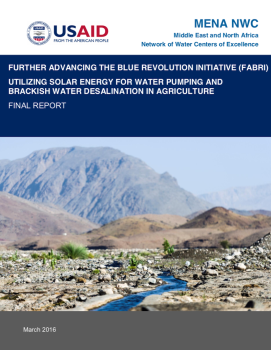Increasing demand for agricultural crops has put an increased strain on limited freshwater resources in Jordan and Palestine. The area currently has shortages in freshwater and an abundant supply of saline water which has not been utilized for agriculture due to the economics associated with pumping and desalinization mainly from limited availability to electricity and high running cost of the alternative diesel generators. Continued improvements in the costs associated with the implementation of large-scale renewable energy has renewed interest in understanding the potential impacts of developing distributed desalination and pumping station for agriculture.
This study, conducted as part of the Further Advancing a Blue Revolution Initiative (FABRI), integrates geographically resolved data with historical meteorological data to critically evaluate the feasibility and impact of the deployment of renewable energy systems for water pumping and desalinization on agriculture production. Specifically the project includes the following activities:
- Surveying brackish water resources, assessing the potential of solar energy and analyzing previous projects for lessons learned and related national policies;
- Reviewing RO and nanofiltration technologies and conduct comparative analysis between both;
- Investigating the current and potential future economic and technical feasibility of PV solar water pumping and desalination and generalizing results through developing and conducting sensitivity analysis to make it beneficial for different locations and for various conditions;
- Identifying through modeling possible high value crops; and
- Development of a medium- to large-scale PV pumping inverter
This project seeks to improve agricultural production and productivity through:
- increased irrigation water availability and improve its quality through water pumping and brackish water desalination using solar energy which will help in food security
- decreased energy cost per unit of agricultural output by recommending energy efficient, well optimized medium- to large-scale modular water pumping and RO desalination systems through the integration of solar systems


